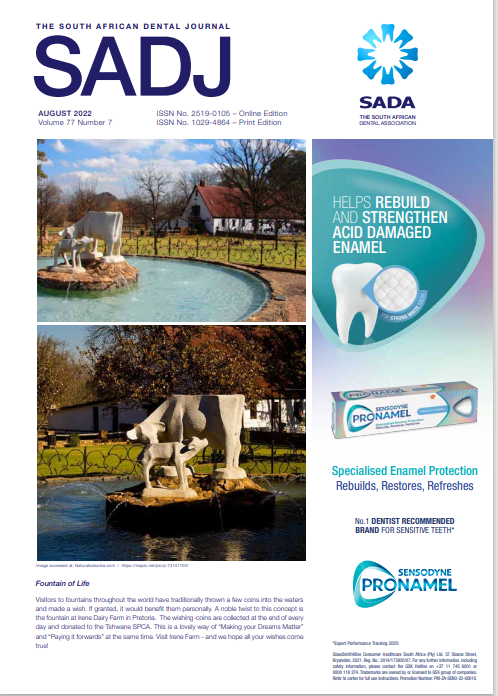Knowledge, attitudes and practices of emergency care practitioners in the management of common dental emergencies in the eThekwini District, KwaZulu-Natal.
DOI:
https://doi.org/10.17159/2519-0105/2022/v77no7a2Keywords:
Common dental emergencies, Emergency Care Practitioners, Emergency Medical Management, Knowledge, attitudes and practicesAbstract
It is essential to provide timeous and appropriate treatment in cases of dental emergencies. First responders such as Emergency Care Practitioners (ECPs) usually provide this prehospital care. The successful management of casualties experiencing common dental
emergencies is dependent on two fundamental factors; the first responder's knowledge and ability to render the appropriate level and standard of medical care, and secondly, the time that expires between the onset of the incident and the initiation of definitive emergency medical treatment. Delayed or inappropriate management can have long term physiological and psychological effects.
This was an exploratory and descriptive study, using quantitative and qualitative methods to determine the knowledge and attitudes of Emergency Care Practitioners of the eThekwini District of KwaZulu-Natal, South Africa, in the management of dental emergencies.
The results revealed that Emergency Care Practitioners had inadequate knowledge, training, and understanding of the management of common dental emeregncies by ECPs. There was limited initial training, with a significant portion of the participants (44.9%, p 0.233) having not received any training at all in the management of orofacial traumas, and with a significant majority (78.3%,
< 0.001) having no further education and training. Most ECPs indicated a desire to receive such training. This study indicated that ECPs lacked confidence in managing dental emergencies, which highlighted a need for specific dental awareness and training programs
to further empower ECPs in the management of such emergencies.
Downloads
References
Skapetis T, Gerzina, T, Hu W.Review Article: Management of dental emergencies by medical practitioners: Recommendations for Australian
education and training', Emergency Medicine Australasia 2011; 23: 142-52.
Samaei H, Weiland T J, Dilley S, Jelinek GA. Knowledge and Confidence of a Convenience Sample of Australasian Emergency Doctors in
Managing Dental Emergencies: Results of a Survey. Canadian Dental Journal 2015. Available at: http://europepmc.org/abstract /med/12513934. [Accessed 15 June 2017].
Robinson E, Rumsey N, Partridge J. An Evaluation of the Impact of Social Interaction Skills Training for Facially Disfigured People. British Journal of Plastic Surgery 1996; 49:281-89.
Zaleckiene V, Peciuliene V, Brukiene V, Drukteinis S. Traumatic dental injuries: etiology, prevalence and possible outcomes. Stomatologija 2014; 16(1):7-14.
Traebert J, Luiza M, Traiano R et al. Knowledge of lay people and dentists in emergency management of dental trauma. Dental Traumatology 2009; 25: 277-83.
Lalloo R.Risk factors for major injuries to the face and teeth. Dent Traumatology 2003; 19:12–4.
Pozner CN, Zare R, Nelson SJ, Levine M. International EMS Systems: The United States: past, present, future. Resusitation 2004; 60: 239-44.
Levine L, Zadi K. Education on and Prevention of Dental Trauma: It's time to act! Dental Traumatology 2012; 28: 49-54.
Zadik, Y. Oral trauma and dental emergency management recommendations of first-aid textbooks and manual. Dental Traumatology 2007;
: 304-6.
Road Traffic Management Corporation (RTMC). (2016). Statement by Transport Minister Dipilo Peters on the occasion to release the preliminary festive season report for December 2015 and January 2016. Available at https://www.arrivealive.co.za/news.aspx?5=1 &1=22624 & page = Statement_by_Transport_Minister_Dipilo_Peters_on_the occasion_to _release_the_preliminary_festive_season_report_
for_December_2015_and _January_2016 Accessed 30 December 2016. [Accessed 14 June 2017].
Braun V, Clarke V. Using thematic analysis in psychology. Qual Res Psychol 2010;3(2):77-101. https://doi.org/10.1191/1478088706qp063oa
MacFarlane C, van Loggerenberg C, Kloeck W. International EMS systems in South Africa: past, present, and future. Resuscitation 2005; 64(2):145-48.
Gassner R, Bösch R, Tuli T, Emshoff R. Prevalence of dental trauma in 6000 patients with facial injuries: implications for prevention. Oral Surg Oral Med Oral Pathol Oral Radiol Endod 1999; 87:27–33.
Trivedy C, Kodate N, Ross A, Al-Rawi H, Jaiganesh T, Harris T, et al. The attitudes and awareness of emergency department (ED) physicians towards the management of common dentofacial emergencies. Dent Traumatol 2012; 28:121–6.
Cruz-da-Silva, B. R., Perazzo, M., Neves, É. T., Firmino, R. T., & Granville-Garcia, A. F. Effect of an Educational Programme on the Knowledge
Level Among an Emergency Service Medical Team Regarding Tooth Avulsion. Oral health & preventive dentistry, 2016; 14(3), 259–266.
Ulusoy AT, Onder H, Cetin B, Kaya S. Knowledge of medical hospital emergency physicians about the first-aid management of traumatic tooth avulsion. Int J Paediatr Dent 2012; 22:211–6.
Andersson L, Bodin I. Avulsed human teeth 398 > RESEARCH www.sada.co.za / SADJ Vol. 77 No.7replanted within 15 minutes-a long term clinical follow up study. Endod Dent Traumatol. 1990; 6:37–42.
Joybell CC, Kumar MK, Ramraj B. Knowledge, awareness, and attitude among the employees in emergency ambulance services towards traumatic dental injuries. J Family Med Prim Care 2019; 8:1043-8.
Aren A, Erdem AP, Aren G, Şahin ZD, Güney Tolgay C, Çayırcı M, et al. Importance of knowledge of the management of traumatic dental injuries in emergency departments. Ulus Travma Acil Cerrahi Derg 2018; 24:136–144
Downloads
Published
Issue
Section
License

This work is licensed under a Creative Commons Attribution-NonCommercial 4.0 International License.






.png)